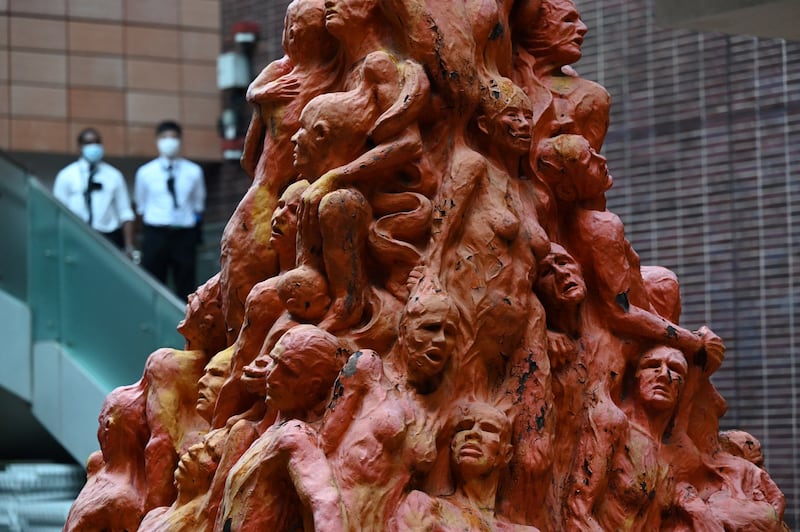Security guards at the University of Hong Kong placed the area around the Pillar of Shame statue on lockdown on Thursday, blocking the view of the monument to the 1989 Tiananmen massacre victims and preventing anyone from approaching the area, as its creator said it had been demolished.
The move came after the university authorities said the statue was being removed "based on external legal advice and risk assessment for the best interest of the University."
It was apparently taken down and dismantled in the early hours of Thursday, while students were on a break.
Danish sculptor Jens Galschiøt, who created the monument, said he was "shocked" that the authorities were removing it.
"The Pillar of Shame is getting demolished right now in Hong Kong," Galschiøt said via his Twitter account. "The sculpture has been covered and is heavily guarded so that no students can document what is going on. This is happening in the middle of the night in Hong Kong."
Galschiøt, who has previously said he is taking legal advice over the University's disposal of his personal property, also forwarded a news release from the Hong Kong Committee in Norway, condemning the move.
"This action is the latest in a series of attempts by the Hong Kong authorities to erase public memory of the massacre in Hong Kong," the statement said, pointing to the forced closure of a museum commemorating the 1989 student-led protest movement, and of the bloody assault on unarmed civilians by the People's Liberation Army (PLA) that ended it.
"The Hong Kong Committee in Norway condemns the authorities' attempts to ... falsify the story of a peaceful uprising in support of democracy and freedom in China," it said.
Exiled former pro-democracy lawmaker Nathan Law tweeted: "The #PillarOfShame is removed, while memory lives. We must remember what happened on June 4th, 1989. #TiananmenMassacre"
The Pillar of Shame was first unveiled at a now-banned candlelight vigil commemorating the victims at Victoria Park on June 4, 1997, weeks before the city was handed back to China.
It has been at the University of Hong Kong since 1998, where students have cleaned and repainted it to mark the massacre anniversary every year.
The university said in its statement that no group had ever obtained approval to display it on campus, however.
"Latest legal advice given to the University cautioned that the continued display of the statue would pose legal risks to the University based on the Crimes Ordinance enacted under the Hong Kong colonial government," it said, adding that the sculpture will be "put in storage."
The statue was placed on the university campus by the now disbanded Hong Kong Alliance in Support of Democratic Patriotic Movements of China, which had it on loan from Galschiøt.
The 32-year-old Alliance now stands accused of acting as the agent of a foreign power, with leaders Chow Hang-tung, Albert Ho, and Lee Cheuk-yan arrested on suspicion of "incitement to subvert state power," and the group's assets frozen.

Many groups disband
The group is the latest in string of civil society groups to disband following investigation by national security police under the national security law that took effect from July 1, 2020.
The annual Tiananmen vigils the Alliance hosted on June 4 often attracted more than 100,000 people, but the gatherings have been banned since 2020, with the authorities citing coronavirus restrictions.
China’s Hong Kong and Macau Affairs Office has accused the organization of inciting hostility and hatred against the CCP and the central government.
Beijing imposed a draconian national security law on Hong Kong from July 1, 2020, ushering in an ongoing crackdown on political opposition and public dissent.
The law forms part of Beijing's claims that recent waves of popular protest for greater democracy and against the erosion of Hong Kong's promised freedoms were instigated by hostile foreign powers intent on undermining CCP rule and destroying social stability in Hong Kong.
Jimmy Lai and several senior journalists at the now-defunct Apple Daily face charges of "collusion with foreign forces" under the law, after the paper called in editorials for sanctions against Chinese and Hong Kong officials.
Translated and edited by Luisetta Mudie.
